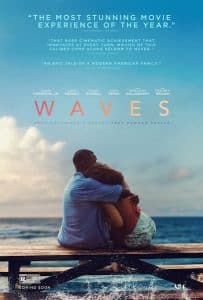Waves | Movie Review

Writer-director Trey Edward Shults is not a name the general moviegoing public will recognize, but this young independent filmmaker is making quite the name for himself. After making the excellent family/addiction drama “Krisha” in 2015 and less successful (and poorly marketed) pseudo-horror film “It Comes At Night” in 2017, Shults returns this year with “Waves.” It is a huge step forward for the filmmaker and the best movie of the year so far.
Opening this weekend, this harrowing film follows the journey of an upper-middle class black family in southern Florida. Led by a well-meaning but strict father (St. Louis native Sterling K. Brown), the other members of the family are Renée Elise Goldsberry of “Hamilton” fame as the mother, Kelvin Harrison Jr. as high school wrestling standout Tyler and Taylor Russell as the quiet, slightly younger Emily.
Harrison, Russell and Brown give performances that rank among the best of the year. Harrison provides an insight into his character by showing the pain he is in and pressure he is under, while still making him frightening. In a breakout role, Russell excels at conveying the pain her character feels in a quiet, authentic way. Brown, meanwhile, gives a nuanced performance that balances his character’s love with his domineering personality.
None of those performances are the best of the year, but Shults’ work as director may very well be. Working with frequent collaborator Drew Daniels as cinematographer, the use of color, camera movement and changing aspect ratio in this film is nothing short of brilliant, as all those elements help to tell the story. They set the tone of the picture while also lending to its propulsive, then later quiet, nature.
The aspect ratio, which is the proportional relationship between the height and width of an image, provides the best example of how these elements impact viewers. It starts filling up the screen, but it slowly shrinks in the first half of the film, as the narrative becomes more unhinged and suspenseful, giving us a feeling of the world being off its axis. In the latter half of the film, the reverse happens as things slowly normalize for these characters.
I’m being particularly dodgy about the details of the story here because I love the ambition Shults displays as screenwriter, and some of that magic is in the surprise. Suffice to say, “Waves” is a film of two parts not unlike the classic “Full Metal Jacket,” with wildly different tones and narrative focus. But Shults pulls it off terrifically.
Shults has also crated one of the most genuine and moving films I have seen. This filmmaker clearly understands the impact of trauma on a family, the effect of parental pressure and the necessity of forgiveness to such a degree that this becomes a tearjerker where every tear is earned. This is a gut punch of the highest order.
Still, it may not be for everyone. Stylistically and narratively, “Waves” is very in-your-face, and Some may find the film of manipulative and excessive because of that. But if the film works for you, it is the kind of experience rarely found in moviegoing. I give it 4.5 out of 5 stars.
“Waves” stars Kelvin Harrison Jr., Taylor Russell, Sterling K. Brown Renée Elise Goldsberry, Alexa Demie and Lucas Hedges. It is rated R for language throughout, drug and alcohol use, some sexual content and brief violence – all involving teens and runs 2 hours and 15 minutes.






